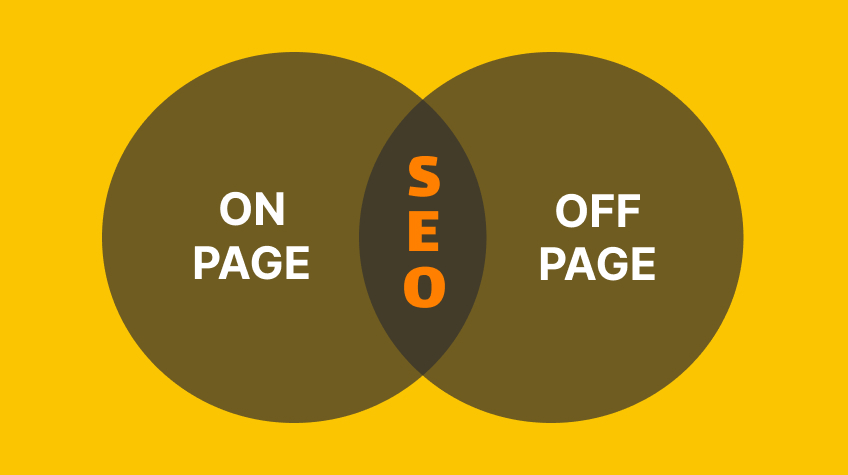Search Engine Optimization (SEO) is a powerful strategy that helps websites rank higher on search engine results pages (SERPs). It involves both on-page and off-page techniques to improve your site’s visibility, attract organic traffic, and boost conversions. This guide will break down the fundamentals of on-page and off-page SEO in simple terms so you can start optimizing your site today.
What Is On-Page SEO?
On-page SEO refers to the optimization of elements within your website to make it more search-engine-friendly. It focuses on content, HTML source code, and user experience. Here are the key aspects of on-page SEO:
1. Keyword Research and Optimization
- Conduct thorough keyword research using tools like Google Keyword Planner or SEMrush.
- Target long-tail keywords that match user intent and have low competition.
- Include primary and secondary keywords naturally in your title, headings, and content.
2. Meta Tags
- Write compelling meta titles and descriptions that include your target keywords.
- Keep titles under 60 characters and meta descriptions under 155 characters.
- Use action-oriented language to encourage clicks.
3. Content Quality
- Create high-quality, original, and engaging content that solves user problems.
- Use headers (H1, H2, H3) to structure your content and make it easy to read.
- Add images, videos, and infographics to enhance user experience.
4. Internal Linking
- Link to relevant pages within your website to help users navigate easily.
- Use descriptive anchor text containing keywords.
5. Page Speed Optimization
- Compress images and enable browser caching.
- Use a Content Delivery Network (CDN) to improve loading times.
- Optimize your site’s code by minifying CSS, JavaScript, and HTML.
6. Mobile Friendliness
- Ensure your website is responsive and provides a seamless experience on all devices.
- Test mobile usability using Google’s Mobile-Friendly Test tool.
7. URL Structure
- Use short, descriptive URLs that include keywords.
- Avoid special characters or numbers in your URLs.
What Is Off-Page SEO?
Off-page SEO focuses on actions taken outside your website to impact your rankings. It’s about building your website’s authority and reputation through backlinks, social media, and other strategies. Here are the top off-page SEO techniques:
1. Link Building
- Gain high-quality backlinks from reputable websites in your niche.
- Use strategies like guest posting, broken link building, and skyscraper content.
- Avoid spammy or low-quality links, as they can harm your SEO.
2. Social Media Marketing
- Share your content on platforms like Facebook, Instagram, LinkedIn, and Twitter.
- Engage with your audience by responding to comments and messages.
- Use hashtags to increase visibility.
3. Local SEO
- Optimize your Google My Business profile by adding accurate information and images.
- Get positive reviews from customers.
- List your business in local directories like Yelp or TripAdvisor.
4. Brand Mentions
- Monitor online mentions of your brand using tools like Google Alerts.
- Reach out to websites mentioning your brand without linking and request a backlink.
5. Influencer Outreach
- Collaborate with influencers in your industry to promote your products or services.
- Influencers can help increase your content’s reach and credibility.
6. Forum Participation
- Join forums like Quora or Reddit related to your industry.
- Provide helpful answers and link back to your website when appropriate.
7. Content Marketing
- Publish shareable content like eBooks, whitepapers, or blog posts.
- Use email marketing to distribute your content to a broader audience.
Best Practices for Combining On-Page and Off-Page SEO
To achieve optimal results, it’s crucial to integrate both on-page and off-page SEO strategies. Here’s how you can do it:
- Start with On-Page SEO: Before seeking backlinks or engaging on social media, ensure your website is fully optimized. A poorly optimized site won’t benefit much from off-page efforts.
- Create Share-Worthy Content: High-quality content naturally attracts backlinks, social shares, and mentions.
- Monitor Performance: Use tools like Google Analytics and Ahrefs to track your SEO progress. Analyze traffic, bounce rates, and keyword rankings to refine your strategy.
Conclusion
Both on-page and off-page SEO are vital for improving your website’s search engine rankings. By optimizing your site’s content and structure while building authority through external efforts, you’ll set your site up for long-term success. Start implementing these strategies today and watch your website climb the SERPs!

